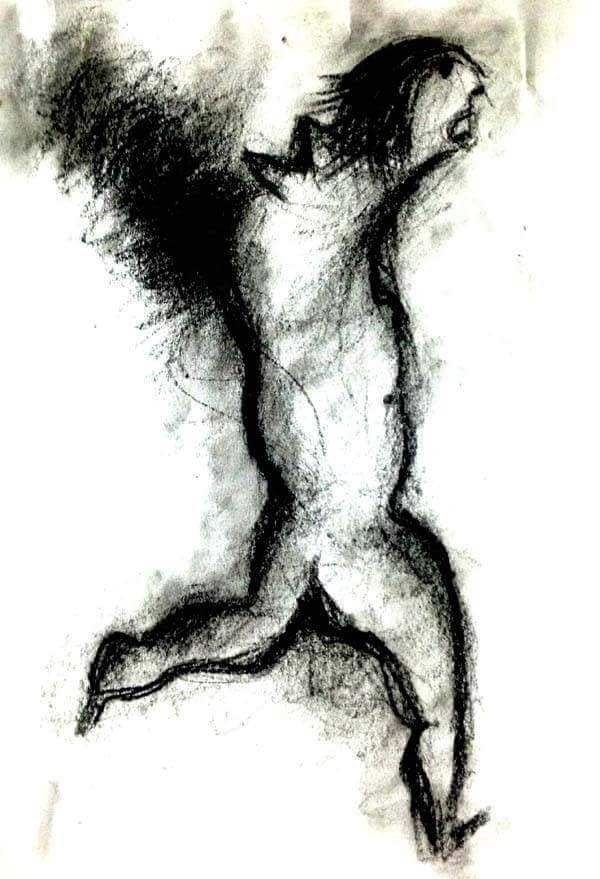Fiction by Najwa Bin Shatwan
Translated from Arabic by Sawad Hussain
In this short story by Najwa bin Shatwan, a Daesh attack forces George to flee the Christian cemetery and take refuge among the Muslim dead of Benghazi.
It was customary for the dead of Benghazi to visit their families whenever they pleased, sticking their noses into every affair—big or small—and, if a revolution were to break out, they would join its ranks, having no qualms about dying twice over. Such was, without fail, the habit of all the dead in Benghazi: those whose final resting place was in the Christian cemetery would invariably step out in the evenings dressed in their finest, impeccable, as if on their way to a wedding, bumping into those of the Muslim cemetery returning from their leisurely sit-downs in cafés, as if retiring after a day’s work.
George Arter George was among those whose graves were in the ancient, manicured cemetery in the neighborhood of Al-Fawehat. George carried on through death with trimmed nails, clad in a fashionable Gucci suit, silk socks, and clean shoes. This was before he sought refuge in the Muslim cemetery in Al-Huwwari, right on the heels of the Daesh attack on his own burial ground that shattered the tombstones, insulting the dignity of those resting there.
Toward the end of an exhausting walk, George almost missed two roses on the Al-Safsafa plot—a patch replete with alfalfa for the cows—that caught his eye. He picked them up to take to his father for his death anniversary. He was counting the remaining steps to the cemetery when he made out the bulldozer, the jellabiyas fluttering in the wind, and the long, unkempt beards.
George knew it was the end; with his foresight, he didn’t even have to think about it. He threw the roses on the road—where they were crushed by cars that weren’t used to stopping even if they ran someone over—and started to run, fleeing this damned black day in the course of his death, running away from a second death without knowing where he was going. He was already in the hereafter; he couldn’t escape it to go back to the world of the living. Nonetheless, whoever had been chewed up by the jaws of life would never go back to it, no matter how painful the torture in the afterlife.
George Arter George squatted by the side of the road leading to the psychiatric hospital, crouching beneath the sole tree there, wishing for a truck to pass by that he could cling to, to take him to the Muslim cemetery. Not a single one of the drivers stopped to give him a lift, believing that he was a mental patient on the loose. And if a Good Samaritan were to stop, he would most likely be bundled off to the hospital so that he wouldn’t harm anyone on the “outside,” God forbid.
As such, it was better to run away from the tree, from Daesh, from the trucks, and from the Good Samaritans, too. He stopped and stood by the stalls of the immigrant salesmen to give the impression that he too was one of them after several years of integration, or that he was a white eggplant—an utterly undesirable soul; in either case, no one would be concerned in the slightest.
Posing as a white eggplant, he finally succeeded in reaching the Muslim cemetery. As soon as word spread to those buried there that there was a strange man among them in an elegant suit, they began to take advantage of him in every way.
As a supposed eggplant, he rushed here and there; he didn’t have to share who he really was until he knew them better.
“Hey George, go and lock the gate, would you?”
“George, go and buy us some smokes, at least you’ve got some clothes on!”
“Go on, George, get us some lunch and dinner. We’re craving some fruit and roast chicken.”
Finally, George got fed up and yelled, “Enough! I want to go back to my own cemetery. My suit’s worn out from walking under the blazing sun, my shoes are filthy, and my beard’s a bushy mess. There’s no electricity to iron my clothes or wash my suit, the whole day the power’s out. And on top of that, you all tell me to get you things from really dangerous neighborhoods where the war is on!”
“Slow down there, George. Take a breath. You want us to treat you nice and good, eh? Have you forgotten that you’re just a white eggplant? Hah!”
Some years later . . .
George’s clothes were threadbare, his hair unkempt, dusty. His shoes had been stolen. What’s more, the owner of the grave next to him had made off with his tie but denied stealing it even though he wore it brazenly round his neck. George stood on wild rugged thorns in the graveyard, his feet bleeding, while he pondered—as a depressed philosopher would—the impossibility of life and death in Libya. No rest for the living, no rest for the dead. Perhaps, in both cases, because of the people. They always found something or the other for him to do, leaving him perpetually on tenterhooks. They would never be satisfied.
When the cemetery’s residents couldn’t find anything else for him to do, they dispatched him to bring them news. “Go on, you eggplant, and bring us some news from the outside.” No sooner had they asked him than he was on his way.
“There’s talk of a Turkish freighter called Andromeda, seized in Greece, carrying 410 tons of explosives, coming from Turkey to the port at Misrata. Because of this, several cases about the war in Benghazi have been opened, as if the investigation will be impartial in the first place. If this ship actually berths here, a lot of the dead will be anxious about their graves. They might be thrown out in order to make space for the new bodies. What shit! RIP my ass!”
Once done speaking, he turned his face toward Europe, envious of the dead over there. Surely there’s no dead person getting up over there simply to die all over again. How many times could Greece intervene and come to our rescue?
George’s friend Mohammed came back from court after finalizing his divorce. “What’s with you, George? You seem more down than the judge. Isn’t there anything on this side that you like?”
“I miss my first grave. I want to go back. The years are passing without any hope in sight.”
“Why are you so worried? You’re welcome here, you know that. Sure, your tie was snatched, and your shoes pass by in front of you every day on another man’s feet, and the old lady occupying the grave over there claims you’ve been harassing her, but you’re still much better off than those people who’ve been kicked out of where they were living. Take the town of Tawergha, for instance.”
“The truth is that I just want to go back to where I was, not because it’s grassy, shaded by trees, or free from litter, but because the cemetery there is full and no one new can come in. As for this cemetery, bodies keep flocking in, in droves really, from all over. Civil war, car accidents, stray bullets, electric shocks, mines, medical negligence, shoddy buildings collapsing, expired food; the list goes on. What will the future be like? It’s making me think about migrating to Europe.”
Mohammed offered his friend some comforting words, then invited him to draw closer to the graveyard fence to watch the wedding procession going past: the cars’ honking mingled with the traditional songs, growing to a crescendo as celebratory bullets freely shot skywards.
“There is hope. There is joy. Come on, George, let’s grab a slice of some of that fun and happiness for ourselves!”
Both of them stood on their tiptoes to get a better look. George finally smiled after not having done so since he had left the cemetery of his father and forefathers, seemingly more joyous than the couple getting married, chiming in with the song they were singing:
The fire of your love, God destined for me,
Scorching like the dusty winds of Al-Ghibli.
While on his tiptoes, consumed by the fire of love, its scorching heat, and Al-Ghibli, Mohammed’s voice pierced through. “Run, George . . . Run!”
George ran without knowing why or in which direction he should go. He just ran, in the same way that a confused fountain would spurt water in all directions. Behind him was a stray bullet from the celebratory wedding shots, dogging him. He ran in a circle as he tried to outwit it, but it continued its pursuit, leaning on its experience with fast chases. He went round the only tree in the cemetery. Fearlessly, the bullet pierced straight through the trunk: one half fell on the head of the old lady who’d complained about being harassed and the other transformed into a coffin from the shock of the impact.
He wove round the graves, first on his feet, then on his belly. Though engaged in a struggle to stay alive, George noted that the dead were clinging to their graves, gripping the edges, white-knuckled, only their heads poking out to watch the fugitive.
He trampled the fingers of one of them while zigzagging through and heard a voice cry out, its curse hunting him alongside the bullet. “Ow, OW! My fingers, you infidel . . . my fingers, you pig! Son of a . . . ”
What the man had said was more painful than the deadly bullet, but George didn’t have the time to set right such wrong ideas, and such people died with their uninformed views still intact.
If the bullet would just give him some room to breathe, he would speak to the Muslims to let them know that he too was of the holy book, not an infidel; that the God these Muslims monopolized for themselves had actually revealed Himself to his community first. But unfortunately he was on the run; no time for anything, even death.
The bullet continued to hound him. He heard Mohammed’s voice trying to rescue him from afar by guiding him to a grave freshly dug that morning. “Take a right, George! Now turn left! Jump into the hole by the cement factory!”
His innate GPS deceived the bullet. It whizzed over the new grave, losing sight of its target. George finally heaved a sigh of relief, opening his eyes as wide as they would go to see God’s beautiful sky. He got the opportunity to see it clearly, a wondrous azure, birds soaring freely. He looked to the walls of his new home and was happy with the quality of the soil. He ran his hand along it: cool, clean, no one had decomposed in it before. Before he could thank God for such a blessing, he heard the sound of the bullet slicing through the air once more, accompanied by the curse of the Muslim, damning him, his religion, and his mother. Horrified, he tried to crawl out of the grave, but the bullet wrapped in the curse circled the grave opening twice before sinking into his forehead with such precision that if its maker had known, he would have increased its price.
Now it was the bullet’s turn to breathe a sigh of relief. Why had George insisted on taking off at such breakneck speed? As for the curse, it was finally silenced once it plunged headlong into the lower half of George’s body, sticking it to him where it would hurt the most.
Yes, indeed, George had died a second time . . . but this time it was at the hands of a wedding bullet, not like the first time; in other words, he died happily ever after!
____________________________
Words without borders



